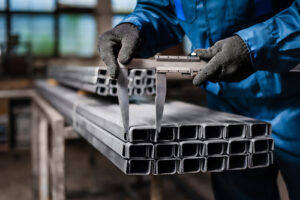Why is Accuracy in Industrial Fabrication Important?
by siteadmin

Why Accuracy is Important in Industrial Fabrication
When it comes to industrial fabrication, accuracy is everything. For example, if a plastic part for a medical device is even slightly undersized, health care providers may struggle to depress the button that operates it to save patients’ lives.
But what’s the difference between precision and accuracy? This article takes a closer look.
Precision Sheet Metal Fabrication
Precision metal fabrication processes are instrumental in transforming raw and flat sheet metal into the custom components, parts, and structures used in various industries. This includes, but is not limited to, construction, automotive manufacturing, aerospace, medical devices and equipment, energy production, and telecommunications and computer equipment and systems.
Among other things, these custom fabrication processes can include welding, cutting, forming, punching, and shearing. These are all done on the basis of a design or blueprint that serves as the roadmap for the fabricator’s process.
For instance, the precise and accurate use of a punching machine can help ensure that each hole or shape punched matches the dimensions specified in the blueprint for that part. This can greatly reduce the risk of error, especially when it comes to creating complex or intricate shapes. The right tools, equipment, and materials also play a big role in precision sheet metal fabrication. For example, the use of high quality steel, a durable and versatile material with an excellent strength-to-weight ratio, can help produce consistent results that are both accurate and efficient.
Precision Welding
Welding is a key fabrication manufacturing process that is used to adhere metals together into the final product. Almost all industries like automotive, oil and gas, construction, aerospace/air transportation, medical, technology/electronics, telecommunication and defense utilize welding to construct the materials needed for their end products.
Precision welding involves following complex blueprints and weld maps to create precise welds on components, or even entire projects. Welders need good interpersonal skills to collaborate with engineers, project managers and quality control specialists to produce high-quality welds that meet or exceed expectations.
The accuracy of precision machining is measured by how close the machine cuts to the exact dimensions that were specified in the design. To be precise, the machine must hit each of these coordinates consistently over multiple units. This type of precision is necessary for a smooth, trouble-free production process. Ideally, precision welds are made on clean metal to avoid contamination issues such as sugaring (oxidation layers) and interference with shielding gases.
Precision Machining
Precision machining is a process that involves a computer-controlled machine following a digital blueprint to cut pieces out of raw materials. It’s used when manufacturing parts with very fine features or tight tolerances that are difficult to create manually.
This type of fabrication is crucial for many industries, particularly in cases where precise dimensions are needed to fit components into larger machines or equipment. For example, in the medical industry, where equipment like respirators and radiation equipment could save lives, precision machining is important to ensure that all of the components fit together without any issues.
Precision machinists can also use this process to repair existing components and tools that have been worn down over time. This is an efficient way to get your products up and running without having to wait for new parts to be made. This helps businesses save money and reduces the amount of time they need to invest in product development cycles.
Precision Assembly
Imagine you’re trying to cut out a figure from a sheet of paper using a pair of dull, rusty scissors. You’re going to struggle, and your result won’t be very precise.
Precision fabrication involves computer-controlled machines that deliver accurate results every time. This is what makes it possible to fabricate parts that are identical and fit together perfectly. This is important because it means there’s less room for error, reducing the cost of returns or repairs down the road.
This process also allows for quicker assembly, making it more cost-effective than traditional methods of production. When parts are precision fabricated and assembled, they can be made quickly and easily without having to wait for additional processes like welding or finishing. This makes it much cheaper to meet large order numbers.
Industrial Fabricator in Oregon
Why Accuracy is Important in Industrial Fabrication When it comes to industrial fabrication, accuracy is everything. For example, if a plastic part for a medical device is even slightly undersized, health care providers may struggle to depress the button that operates it to save patients’ lives. But what’s the difference between precision and accuracy? This…
Recent Posts
- Your Trusted Choice for Premier Plumbing Services in Lexington, KY
- The Premier Ohio Cavapoo Breeder Elevating Puppy Adoption
- Ironchess SEO + Marketing Unveils Social Media Pest Control Strategies
- Forest Moving and More LLC: Your Premier Portland Moving Company for Local and Long-Distance Relocations
- Elevating Roofing Standards in Zanesville, Ohio
